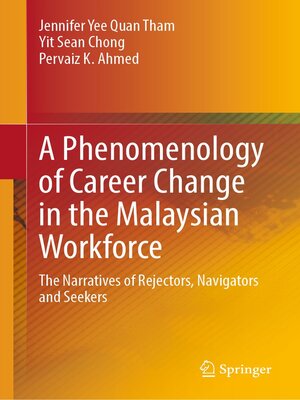A Phenomenology of Career Change in the Malaysian Workforce
ebook ∣ The Narratives of Rejectors, Navigators and Seekers
By Jennifer Yee Quan Tham

Sign up to save your library
With an OverDrive account, you can save your favorite libraries for at-a-glance information about availability. Find out more about OverDrive accounts.
Find this title in Libby, the library reading app by OverDrive.



Search for a digital library with this title
Title found at these libraries:
| Loading... |
Evolution in economy, technology and social institutions over time have given rise to boundaryless and Protean careers that promote mobility and self-direction in managing one's career. This has led to the phenomenon of career change whereby individuals undertake a shift from one field of work to a completely different field of work. In career change research, career changers have been studied as a collective, singular group undergoing a similar change experience, which neglects individual differences that may contrast the experience of change from one changer to another. Furthermore, the emotional experience that accompanies a career change has been examined with a primary focus on the role of positive emotions, which overlooks the role of negative emotions in career change. Thus, this book sheds light on three key narratives of career change; Rejectors, Navigators and Seekers, that were identified in a phenomenological study of career change amongst Malaysian working adults. Semi-structured interviews were conducted with 30 career changers across age, gender and ethnicity with a focus on how they made sense and meaning of their lived experience of career change within their environment and context. Each career change narrative was found to have different characteristics, motivations and behaviors respectively, which shaped their unique career change process. Negative emotions were also revealed as key drivers of the career change process, although each narrative expressed different types of negative emotions.Finally, the book also introduces an adaptive perspective to career development by way of the Adaptive Career Construal Model (ACCM) which was proposed based on the continuous bi-directional relationship between career decisions and career outcomes.






